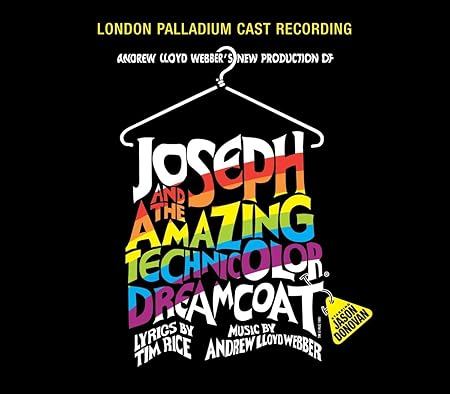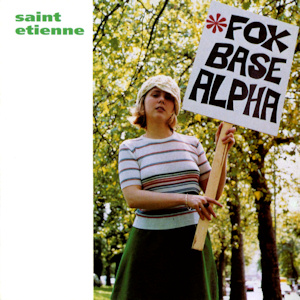
(#432: 31 August 1991, 2 weeks)
Track listing: Prologue/Any Dream Will Do (Single Version)/Jacob & Sons–Joseph’s Coat/Joseph’s Dreams/Poor, Poor Joseph/One More Angel In Heaven/Potiphar/Close Every Door/Go, Go, Go Joseph/Pharaoh Story/Poor, Poor Pharaoh/Song Of The King (Seven Fat Cows)/Pharaoh’s Dream Explained/Stone The Crows/Those Canaan Days/The Brothers Come To Egypt–Grovel, Grovel/Who’s The Thief?/Benjamin Calypso/Joseph All The Time/Jacob In Egypt/Finale: Any Dream Will Do-Give Me My Coloured Coat/Joseph Megamix
A production of Joseph was mounted during my first or second year at school. It was not overly fussy – it may actually have been a concert staging – and adhered to the show’s then-standard thirty-five minute span. I say “then-standard” but the show had in fact been substantially expanded in 1974; this cast recording lasts just over an hour (if one erases the seemingly endless and frankly unlistenable “Joseph Megamix”) and, although the time whizzes by surprisingly speedily, it still feels strained in places.
It was the second musical composed by Andrew Lloyd Webber and Tim Rice – the first, The Likes Of Us, about the life and work of the philanthropist Thomas John Barnardo, never really got beyond demo tape status – who had been commissioned by Alan Doggett, head music teacher at the Colet Court preparatory school in Barnes, to write a fifteen-minute “pop oratorio.” It was duly performed at that school. It went down well and a second, slightly longer version was subsequently performed at the Westminster Central Hall. In the audience for the latter was the Sunday Times’ music critic Derek Jewell, who praised the piece fulsomely; a third performance, this time at St Paul’s Cathedral, saw the arrival of the familiar thirty-five minute template.
A recording of that version was released by Decca in 1969. Further to the international success of the duo’s Biblical sequel, Jesus Christ Superstar, Joseph was itself marketed as an inadvertent “sequel” and amateur productions of the show began to spring up in the U.S.A. In the early seventies, the show enjoyed an extended run at the Young Vic and then the Albery Theatre in the West End. The “full” Joseph premiered at Leicester’s Haymarket Theatre in 1974 and since then has been produced on innumerable occasions around the world.
Listening to the album of the 1991 production, Lena mentioned to me the books she used to see as a child which told simplified Bible stories and were very colourful. Joseph is perhaps a step-and-a-half up from that level. As befitting what is essentially a musical for children, the show takes the form of a lesson given to pupils of a Sunday school Bible class by a “Narrator” with illustrated live-action reproductions of key events. The latter are represented by fast-paced pop parodies and occasional tragic nods to Viennese operetta, and there are only two really memorable songs; “Any Dream Will Do,” which when sung at the show’s beginning is slightly baffling – what is he trying to describe? – but whose meaning becomes reasonably clear when reiterated at the show’s close, and the big weepie “Close Every Door.”
Tim Rice’s lyrics make light weight of what is a fairly gruesome story – I will not retread it here, but it is present in the Book of Genesis for all to see – while Lloyd Webber has great fun romping through the attic of pop history, touching on country, calypso, Elvis, Brill Building girl pop, soft psychedelia and even, at one point (“Those Canaan Days”), Lionel Bart (John Cameron, who oversaw Bart’s sui generis 1969 album …isn’t this where we came in?, does the orchestrations throughout). Yet this is mostly breathlessly delivered in the style of a Monty Python routine; the show is its own hallucinatory megamix, a semi-abstract fantasy of pop, if not an especially compelling one.
Joseph has a reputation for restoring popularity to fading teen idols – David Cassidy and Phillip Schofield (the only non-musician to appear on the cover of Smash Hits magazine) have both played the role, as did Donny Osmond in early nineties Toronto – and since Jason Donovan’s pop career was by 1991 in steady decline, he wisely sidestepped into musical theatre. It certainly paid off; his reading of “Any Dream Will Do,” recorded with the Rickmansworth Masonic School Choir and the Capital Arts Theatre School Choir, gave Donovan his first number one single in two years, and his comeback was securely confirmed (the song had been a major Australian hit in the seventies for Max Bygraves). Overall, Donovan doesn’t do too badly here and can even be said to hold his own, although his is not the show’s dominant voice, in which latter respect there is far too much of Linzi Hateley’s Narrator, whose unrelenting goody-goody tones cumulatively become intensely irritating. One marvels at the actual Joseph getting a look-in at his own musical, as opposed to endlessly being sung about.
There is not too much else to say about the show or this production, other than reminding us how good Sondheim’s Into The Woods (with an actual narrator who narrates) is. It’s certainly an improvement on Aspects Of Love, although that bar is pretty low. However, Superstar was a far sharper musical and its authors must have known that and worked towards it. Moreover, when one considers semi-abstract fantasies or hallucinatory megamixes of pop in 1991, another album released that year springs instantly to mind.
Foxbase Alpha appeared a couple of months after Joseph and peaked at a modest #34 in the charts. To some degree it dozed in the shadow cast by their near labelmates Primal Scream and Screamadelica. Yet I revisit it far more frequently than either of these latter two records. In some ways, when compared with Screamadelica, Foxbase seems to me the more radical album, its strategies subtler, but quietude does not always pierce the skin of loud demonstrativeness.
One useful differential is that while Screamadelica tries to persuade you that Exile On Main St. is the most “important” album ever made, Foxbase suggests taking Dazzle Ships into consideration. Just how influential did the fourth OMD album prove to be in the long term? The album begins with a treated Radio France football theme, and the cut-ups of “Wilson” mirror the dislocation of “ABC Auto-Industry.”
Foxbase circles around pop but never quite settles in its centre. The Neil Young reimagining works because it is not quite the cosy mash-up of woodcut 1970 nostalgia and 1989 beats which one might have anticipated. Nicky Campbell, whom you may recall annotated Essential Pavarotti II, shrugged his shoulders at this reading, remarking that it might sound good in the club at two in the morning when you have a Bloody Mary in one hand and are clinging to the wall with the other. The singer on this “Only Love Can Break Your Heart” is Moira Lambert, normally a member of the excellent and unheralded indie group of the time Faith Over Reason, while Harvey Williams, seconded from the Field Mice, plays bass.
So there is a residual C86 ethic in the record’s fabric, but the Soul II Soul beats are a little too echoey and harsh to offer comfort. They increase in intensity towards the record’s end, as though the singer’s mind is being shredded to atoms, the beats of that breakable heart pounding through the ears, on the point of annihilation.
This is not going to be a merry revisit of indie times.
Sarah Cracknell appears a little while later, singing her way through the dub steps of “Carnt Sleep” as though bereaved. Even when she begins to sing, the music remains on the outskirts of pop. It chooses its samples with acuity – Archie Bell and the Drells, the Four Tops, Dusty Springfield all turn up along the way, as though to scold, if not quite embrace, the nineties. “Spring” is spellbinding, “Girl VII” sends psychogeography to Heaven (the one behind Charing Cross Station), “Nothing Can Stop Us” dares to offer us a kiss and remind us of the Northern seventies, old commercials, television comedy guest slots, the primary-coloured illuminated signs you found at the front of pubs in Blackpool, with the accompanying, warming aroma, memories which in some cases you might prefer not to revisit. It should have gone to number one, but people wanted large, simple slogans. “She’s The One,” endlessly pummelled by Levi Stubbs (it could have been called “Loco in Alperton”) and tailed by a quote from THAT Spector song, is terrifying.
As with side two of Low, the album then stretches out. “Stoned To Say The Least” is not the best of titles, to say the least, but is a fine extended meditation on Deep House (“The Sun Setting,” perhaps – we are not quite ready for “Setting Son,” not just yet) with an indelible sadness (that last, high pitch just won’t, or can’t, let go, like Thomas Hardy’s dog the night before he passed on). “London Belongs To Me” escorts baroque through A.R. Kane filters and becomes an echo of itself; happy for now but prematurely melancholy at the knowledge that this shall not last, as World of Twist didn’t, as London likely hasn’t.
To say that Foxbase Alpha is a London album is stating the flipping obvious. In 1989 it might have caused a greater sensation, or up against “I Am The Resurrection” it might have not. Jon Savage’s liner note pinpoints 4 June 1989 as a day when things happen. Whom am I fooling – this was my life at the time. The journey into town – we came in from Oxford, so would have seen London from the West(way) – the rummaging around in Camden (let us not kid ourselves; apart from cassettes of new stuff for the Walkman, it was records all the way; compact discs back then were absurdly expensive and not very reliable), the uncovering of new or unconsidered worlds. The knowledge that at the time you could even hoof your way down towards Our Price in Hampstead and find something of life-altering interest. And that is all gone now, just as
Do we know what was happening elsewhere in the world on 4 June 1989?
Yes I know I said I wasn’t going to talk about other albums here, but, you know, you sit there listening to one re-reading of pop history, begin to wonder and you get an idea.
Foxbase Alpha was mostly, if not solely, recorded in Mitcham. For private reasons, I find that immensely reassuring.
“Like The Swallow” staggers into view. A tolling Morricone bell announces a brief vocal before the music is slowly and methodically obliterated by this huge sodding wall of white noise and unmoored guitar feedback.
Something else on Creation before the year is out.
That sad acoustic guitar at the end, plucking its way out of the curdled candied corn.
Your mum, singing along to an old, old song on the parlour piano. Thirty-two seconds. Tomorrow’s transmissions.
And yet there is this echo which permeates right through Foxbase Alpha and by George if it isn’t the same echo which, post-Drake, has permeated all of today’s mainstream pop (what I prefer to term “Xanax pop”); dreamy, murmured hall-of-mirrors backing vocals, indistinct orchestrations, and hey kids, they were right all along, how about that?
Foxbase Alpha’s marriage of the past and future will, if you have not heard it before, baffle you initially but spellbind you ultimately. It is in love with the story of pop but not imprisoned by it. It knows, as did Metallica and k-punk, that if you want to dig yourself out of hell, you have to start from where you are. As the Joseph of “Close Every Door” would have told you.



